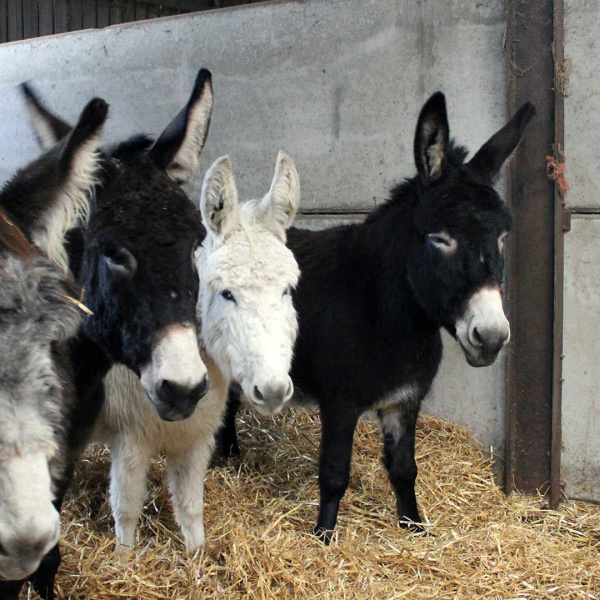A group of neglected donkeys who were found living in dangerous conditions are now safe in the care of international animal welfare charity The Donkey Sanctuary.
The donkeys, named Parsley, Sage, Saffron and Sorrel, were discovered living among loose electric fencing tape, piping, exposed nails and plastic wrapping, which was strewn across their field near York.
Alongside the dangerous debris, the donkeys were also exposed to noxious plants including ragwort, which can cause liver damage to equines and other livestock animals, and in some instances can be fatal.
On arrival at the site in July 2021, The Donkey Sanctuary’s Head of Welfare Hannah Bryer discovered an area of the paddock also needed repair, and a loose length of fencing tape was strewn across the field, which could have caused the donkeys serious injury if they became entangled.
Hannah could see the donkeys were all in poor condition and needed urgent veterinary care. The bones of Parsley’s neck, shoulders, spine, ribs and hindquarters were easily felt, and Hannah observed areas of muscle wastage.
Hannah said: “Parsley’s coat was matted and infested with lice, and his feet were overgrown and in need of farriery care.
“He was visually very underweight and worryingly he was also very quiet and subdued. Changes in condition and behaviour are often signs something is wrong so my priority was to get him checked over by a vet.”
Sage also had lice and was overweight with the development of fatty pockets over the ribs and hindquarters. Her hooves were also overgrown and she was lame, finding turning particularly difficult.
Saffron and Sorrel both had scabbed areas of skin across their neck, shoulders and limbs and their hooves were also overgrown.
Hannah said: “Although the owner had previously been given advice by the RSPCA to improve the conditions, we were unable to reach them and therefore we worked with the RSPCA, North Yorkshire Police and a local equine vet to safeguard the donkeys’ welfare.
“After veterinary examinations, the donkeys were transported to a nearby holding base, where they received all of the necessary veterinary, farrier and dental treatment.”
After the donkeys were removed, the owner contacted The Donkey Sanctuary and later agreed to relinquish the donkeys into the care of charity.
Hannah added: “‘The Herbs’, as they are affectionately known, are friendly, curious donkeys who had sadly found themselves in need of our help.
“During their time at the holding base, they have needed lots of support to help them feel more confident when being handled and when the farrier comes to trim their feet.
“They continue to be monitored from a veterinary point of view and are currently receiving training to support their behaviour and will later be assessed to see if they are suitable for rehoming.”
Donkey Guardians are essential to The Donkey Sanctuary, providing safe loving homes for hundreds of donkeys. The Rehoming Scheme helps to free up vital space in the charity’s sanctuaries for donkeys who require more specialist care.
For interviews, images and information please contact The Donkey Sanctuary press office on 01395 573124 or 07870 849563 (including out of hours) or send an email.
The Donkey Sanctuary is the world's largest equine welfare charity. Our vision is a world where donkeys and mules live free from suffering and their contribution to humanity is fully valued. We run 10 sanctuaries around the UK and Europe, giving lifelong care to more than 7,000 donkeys and mules. Our hospital treats sick donkeys and trains vets both nationwide and worldwide. Our donkey-facilitated learning programme helps vulnerable children and adults develop life skills by connecting with donkeys on an emotional and physical level. The charity operates programmes worldwide for animals working in agriculture, industry and transportation, and those used in the production of meat and skin.
Please note that the name ‘The Donkey Sanctuary’ should not be abbreviated to ‘Donkey Sanctuary’, and the word ‘The’ should always appear with a capital ‘T’ as above.
